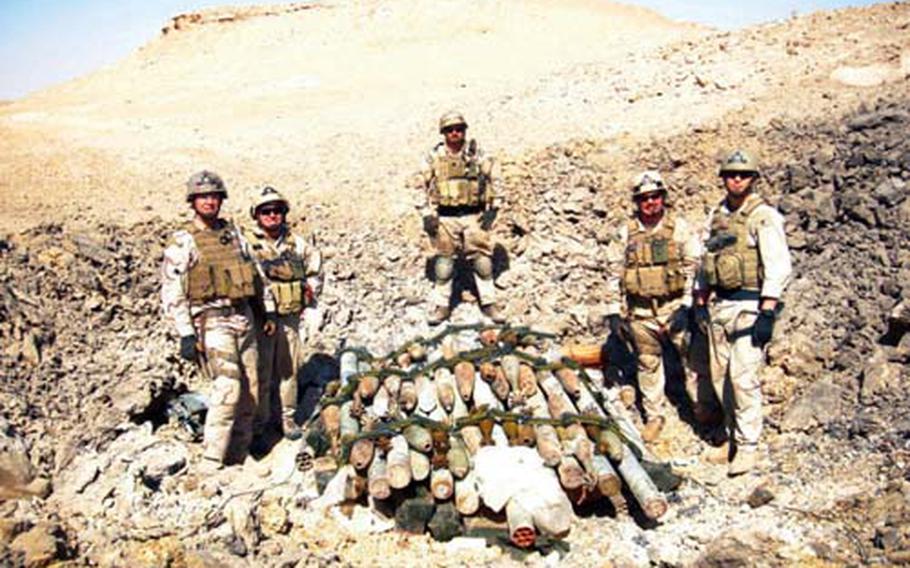
Petty Officer 1st Class Albert Alvarez, center, was awarded a Bronze Star with "V" device for disposing of two roadside bombs after his unit's robot had flipped and unable to perform its tasks. (Photo courtesy of Albert Alvarez)
Petty Officer 1st Class AlbertAlvarez
Unit: 4th Force Reconnaissance Platoon, U.S. Marine Corps
Medal: Bronze Star with “V”
Earned: June 2, 2007, Anbar province, Iraq
Petty Officer 1st Class Albert Alvarez hesitantly walked toward what he thought were roadside bombs planted in a culvert along his convoy’s path in the dangerous Anbar province of Iraq.
The bomb-defusing robot operated by his Explosive Ordnance Disposal team member had flipped and was out of commission.
So taking care of the roadside hazard that impeded the convoy’s progress was up to him and him alone — and as luck would have it, a blinding sandstorm was at their heels.
He approached, step by uncertain step.
“The whole time, what’s going through my head as I was walking down there, almost matter-of-fact, were thoughts like, ‘If this is my time to go, then so be it. Hope my family will be taken care of. This is what I signed up to do, what I’m getting the big bucks for.’
“And I was thinking, ‘Great, there’s this dust storm and it sucks, but we’re already in the middle of this. If I get hit, a helo can’t come and rescue me. I’ll be stuck here, maybe bleeding out.’ ”
“What’s going through my head? ‘I’m going to be toast,’ ” said Alvarez, 34, an EOD technician now stationed with EOD Mobile Unit-8 in Sigonella, Sicily.
Nonetheless, he approached the two roadside bombs, one on each side of the road. They had not been there a mere five hours earlier, when Alvarez and the Marines of 4th Force Reconnaissance Platoon convoyed over to a oil refinery to carry out a mission against a suspected insurgent target.
The dust storm had rolled up on them — as did a white Toyota pickup that seemed to come out of nowhere, said Alvarez, a Navy veteran for 15 years and with EOD for the past six years.
“A bunch of guys jumped out right there. We have no idea where they came from. With the dust storm, you couldn’t see hardly anything. I was on my radio yelling for someone to get these guys out of there. My first thought was that they were innocent bystanders who were going to get hurt. But I didn’t know who they were.
“When they saw the Marines approaching, they jumped back into the truck and took off.”
Just like that, the men disappeared as rapidly as they materialized, recalled Alvarez, married for 10 years and father to an 18-year-old stepson, 10-year-old daughter and 8-year-old son.
He again concentrated on the mission at hand.
Prone, Alvarez placed his first charge of two blocks of C4 explosive with a timer on the first bomb. He noted the wires running between the two.
“I pulled smoke, grabbed my robot and moved to the next.”
He shimmied across the road and dangled his second set of blocks above the second bomb, but something went wrong.
“It falls out of my hands, and I’m thinking, ‘Oh man.’ But it landed perfectly. … Somebody was looking out for me.”
Four minutes later, the controlled booms went off.
Debris splattered as the bombs exploded, sending bits of tank rounds and artillery projectiles flying, he said. Not a single warrior was hurt.
Alvarez was on his second deployment to Iraq and knew well that area of Anbar province. The bombs appeared in an area about 40 miles from Al Asad Air Base that he knew well and had already alerted Marine leaders to keep a look out.
His second tour had him in Iraq from March 23, 2007, to Oct. 2, 2007, and his citation accompanying his Bronze Star with “V” device honors him for providing explosive ordnance disposal support for 2,500 square kilometers, 12 cities, and 200 kilometers of military supply routes. He supervised 42 disposal operations, and ensured “the safe reduction of 2,432 pounds of enemy ordnance and explosives,” the citation reads, in part.
“On two occasions, [Alvarez] conducted extremely dangerous manual disarming procedures on improvised explosive devices, without regard to his own personal safety, ensuring the safety of coalition forces and civilian personnel,” the citation says.